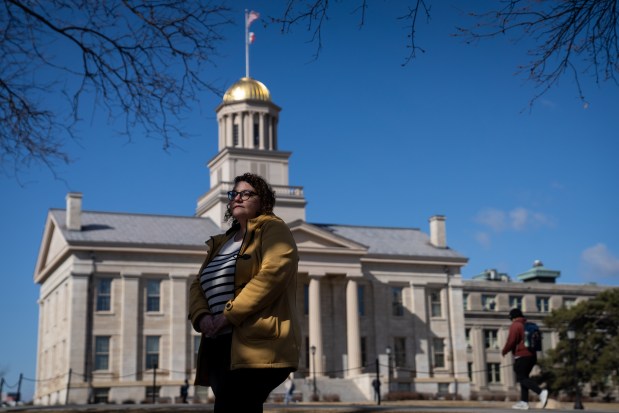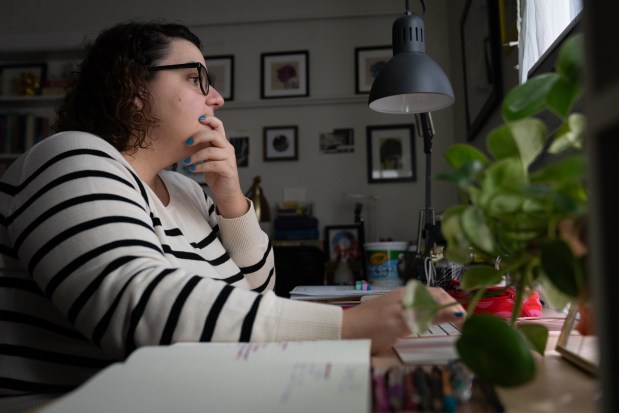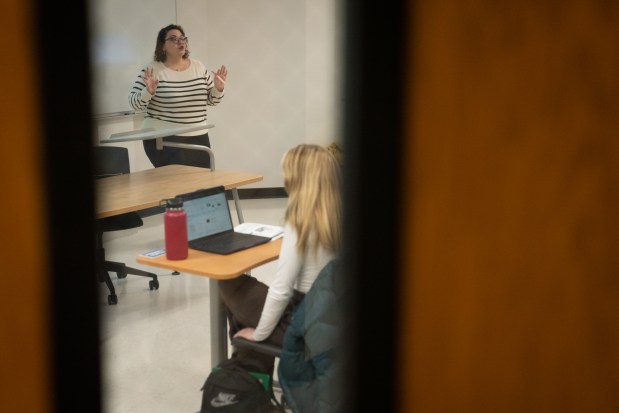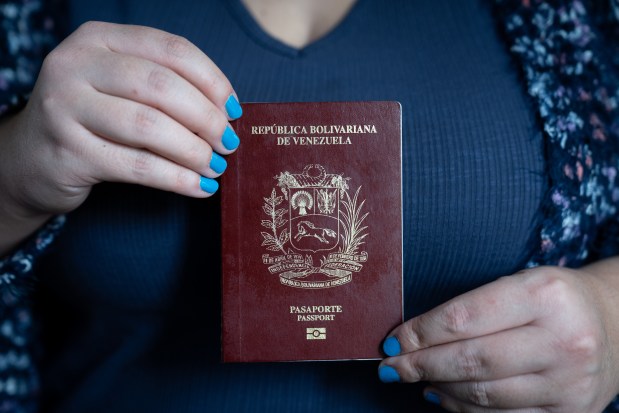When Oriette D’Angelo, in the fifth year of her doctorate program at the University of Iowa, found out that President Donald Trump had plans to revoke her temporary protected status, she told her friends she would mail them her notebooks of poems if she had to go back to Venezuela.
They asked her why.
“It would be almost impossible to start over,” she said.
She’d put years into her degree in Spanish and Portuguese, only to have it threatened by Trump’s immigration agenda.
D’Angelo, 34, came to Chicago on a student visa over a decade ago, seeking professional opportunities and escape from a crumbling infrastructure and violence in her home country. In recent months, however, a string of executive orders and court decisions on the legality of these orders has left her in an uncomfortable state of limbo, grasping for loopholes that might let her continue her academic research and writing.
As a student who researches and writes poems about themes of dictatorship, she is heartened by the separation of powers in the United States, but said the federal government’s often contradictory language in this moment feels dangerous.
“Venezuelans are being categorized as bad,” she said. “But I want to stay here professionally. I want to finish my dissertation. I want to follow the right path.”
Changing status
D’Angelo’s legal status changed several times over the course of a decade as she navigated the processes of U.S. Citizenship and Immigration Services.
She grew up in Lechería, Venezuela, a beach city with white buildings and red thatched roofs, which she said was peaceful in the 1990s and early 2000s. Throughout her young adulthood, she watched Venezuela slowly decline under the leadership of the country’s far-left leaders, Hugo Chávez and Nicolás Maduro.
She had a student visa upon her entry to the U.S. in 2015, as her purpose for coming to Chicago was academic and professional.
When her Venezuelan passport expired in 2020, she applied for temporary protected status, or TPS, a form of relief that allows individuals from certain countries experiencing ongoing conflict or disaster to live and work in the U.S. for a specified period. But due to Venezuela’s broken diplomatic relations with the U.S., all the consulates were closed. She had to travel to Colombia to renew it.
And when D’Angelo came back through O’Hare International Airport in late November 2024, she was processed under TPS, not her student visa. She lost her international student status, despite her main purpose for moving to the U.S. being to study.

Then, in late January, Trump revoked her temporary protected status. In a few months, it could expire, she said, and she would have no legal documents.
D’Angelo is set to complete her doctorate in May 2026. She said everything she had worked for — her professional future and career aspirations — was put in jeopardy.
“The (Venezuelan) government is persecuting and detaining people who speak freely against them, so I couldn’t imagine doing research like mine in my own country,” she said. “It wouldn’t be possible.”
Following the news of her status being revoked in January, she immediately began preparing statements and documents for an international student status application. The processing and legal fees would add up, so she made a GoFundMe page to raise over $10,000.
At a time of intense fear, D’Angelo and her girlfriend decided to get married in mid-March. They didn’t make the decision for immigration purposes, D’Angelo said, but for concern about federal attacks on LGBTQ rights.
“With the current administration, we don’t know if same-sex marriage will still be legal in the next few years,” she said. “We want to be together.”

‘The longest month of my life’
As Trump ramped up the pressure on international students over the spring, D’Angelo took down her GoFundMe and kept a low profile. Every day in March, pulling up the news was a new type of anxiety.
“It was the longest month of my life,” she said.
Her stress was so out of control that it started to affect her memory, D’Angelo said. She couldn’t remember what had happened a day before.
With the help of online donations, D’Angelo submitted an international student status application in March, which was approved by the U.S. Citizenship and Immigration Services in mid-April. Receiving her status while watching more federal changes and mandates come in every day was surreal, she said. And, it all still feels fragile.
About a month after she received her status, the U.S. State Department temporarily halted interviews abroad with foreign citizens applying for student visas and expanded scrutiny of applicants’ social media.
“Survival mode is not over,” she said. “Even though I have my student status back, I’m really not safe.”
D’Angelo is concerned that funding for her program might be cut. She is cautious about what she shares on the social media platform X, as the Trump administration has said that it doesn’t want to let in international students who are critical of the country. After spending years studying the patterns of dictatorships, she said that she can sense when politics becomes personal.
“It’s getting very real,” she said.

‘It’s impossible to fully describe what it was like’
Recent data shows that almost 8 million Venezuelans have left the country in an exodus, a quarter of the population, in the largest Latin American displacement in recent history.
Poetry was a way for her to escape the violence in Caracas, where she lived and studied in her early 20s, and where at least three times she was walking back to her home and passed dead bodies on the street, she said.
“It’s impossible to fully describe what it was like,” she said. “But that’s also something that motivates me. It’s part of everything I do.”
In her poems, D’Angelo writes about gender-based harm, using threads from personal experience in a close relationship she had at age 21 with one of her professors, whom she said turned abusive.
She compares unemployment, hunger and violence to a chronic illness that corrodes everything. Her work reflects the belief that human beings, inherently political, will do whatever it takes to survive, like humans traversing mountains and crossing borders in pursuit of a better future.
‘It’s worth it’
At a recent book fair at the University of Chicago, D’Angelo sat on a panel with other writers from Latin America and talked about her childhood in Lechería. Her home was paradise, she said, except she loved to read and there were no bookstores. The only one was converted into a clothing store a few months after it opened.
Hungry for a literary community, she began writing online, she said. She read authors like Octavio Paz and Mexican poet Leticia Cortéz and imitated their vivid style, using rich metaphors to explore big themes.
Light shone through the window in a perfect square in front of them.
“Bruises on the skin know nothing of forgiveness / Dried-out wounds only tell one story,” she read.
In an interview with the Tribune afterward, D’Angelo said that most Venezuelans come to Chicago because they are forced out of their homes, seeking physical safety or economic security that they don’t have.
“It seems so unfair that the people who ran away from that … are now forced to go back, when they came here looking for safety,” she said.

D’Angelo’s second book will come out this month. Her goal is to teach at a university upon graduation, which she is allowed to do under her student status.
As a professor, she said she wants to help her students understand that their dreams are valid, no matter where they come from.
D’Angelo’s arm is covered with tattoos: a hummingbird, her mother’s handwriting, and designs like air and flowers.
The Trump administration has used tattoos in combination with other justifications on a checklist to deport migrants, but hers remind her of beauty and home. They give her strength.
“Vale la pena,” reads one in cursive lettering on her left forearm, in English, “It’s worth it.”



